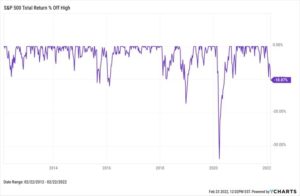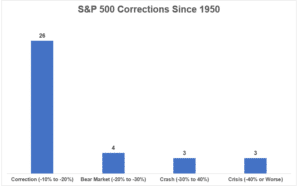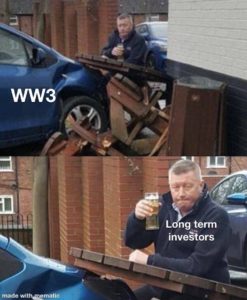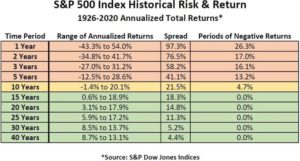I wasn’t sure what I was going to write about this week and was thinking about different topics when this Russia-Ukraine situation blew up and captured everyone’s attention. Obviously, I’m not a political expert or a scholar on foreign policy, but big geopolitical events like this can be difficult to navigate as an investor.
Our minds tend to jump to worst-case scenarios during tragic events like this as anxiety and emotions run wild. It almost seems inappropriate to talk about stocks and financial markets during times such as this.
Investment losses can be recovered over time, but lost lives can’t. It’s important to keep the right perspective with these things.
With that being said, I do think it’s valid that many people have concerns about what all of this will mean for their own personal financial goals that are tied to their investment portfolios.
So, let’s talk about those investment “losses.”
I’m writing this on Thursday, so I don’t know what will happen over the weekend, but as of now the U.S. stock market is officially in “correction” territory:

A market correction is a decline of 10% to 20% off of previous highs. There are plenty of reasons why the stock market is dropping right now. This week it’s been all about Russia going to war with Ukraine which, understandably, has many people worried that this 10% correction could get even worse.
However, it’s important to remember that most of the time the stock market falls, a correction is more likely than a crash. Roughly three out of every four double-digit drawdowns have just been corrections:

As I wrote about a few weeks ago, corrections are a feature of the stock market, not a bug. The only reason you can get returns over the long run is because you occasionally experience losses in the short run.
Historically speaking, geopolitical events have had very little impact on the long-term trajectory of the stock market and economy. They’re frequently just little blips on the radar for the stock market and how you deal with them will likely determine your success as an investor.

Despite regular drawdowns, the S&P 500 is still up 7,670% since 1980.
The longer your time horizon, the less you need to worry about short-term volatility:

Of course, this is far easier said than done. Logic would suggest that with all of the information and data we have available at our fingertips, like the chart above, being a long-term investor should be easier than ever.
But the exact opposite is true. The sheer amount of bad news and differing opinions that flow to us during times of crisis make it extremely difficult to stay the course. That’s why it’s hard to understand what a bear market feels like until you’ve lived through one.
Most long-term investors will say that they’re fine with double-digit market declines because they imagine a world where things are the same as they are today, but stocks are 20% cheaper. In that scenario, it feels like an opportunity. But what actually makes the market fall are things like a pandemic, or a recession where you’ll lose your job, or a terrorist attack, or a war, or inflation with no end in sight. And in that world — the real one that we live in — things feel different.

Morgan Housel has said:
“All past declines look like opportunities and all future declines look like risks.
It’s one of the great ironies in investing. But it happens for a reason: When studying history you know how the story ends, and it’s impossible to un-remember what you know today when thinking about the past. So it’s hard to imagine alternative outcomes when looking backward, but when looking ahead you know there are a thousand different paths we could end up on.”
It may feel like the world is unraveling at the moment. But someday it’s not going to feel like that anymore.
It’s never fun when stocks go down, but there’s no upside without the downside. You just have to learn to live through it.
Thanks for reading!

